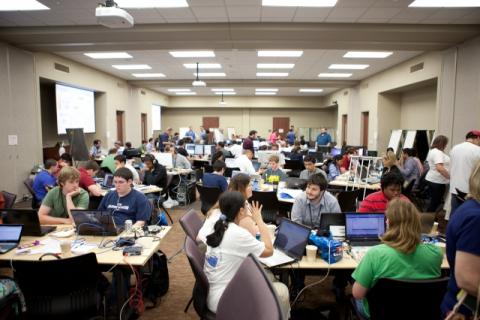Learning More Than Code

Every year, Lafayette is inundated with hundreds of students and professionals with knowledge in software development and technology innovation to take part in the annual Cajun Code Fest event held at the University of Louisiana at Lafayette. This year they worked in teams to develop a Smart Communities application that will assist the Lafayette Consolidated Government with improving local education, healthcare, and public safety.
Our computer science master’s degree students and our computer engineering master’s degree students are regular participants in this coding fest, giving them some great real world experience, as well as a chance to show off their coding and programming skills. But here at UL Lafayette, our computer science and engineering master’s students learn a lot more in their program than how to code. Coding is taught at hundreds of institutions around the world, but UL Lafayette is a truly unique program that offers its students the opportunity to explore all areas of computer science and engineering, mainly through research projects in our cutting-edge specialty labs.
The Center for Advanced Computer Studies (CACS), founded at UL Lafayette in 1984, merged the similar, yet very different, disciplines of computer science and computer engineering into a successful graduate program. UL Lafayette was the first institution in the nation to do so, and this merger has created a unique educational environment that fosters award-winning and innovative research, interdisciplinary cooperation, cross training, and highly prepared graduates.
Advanced Research With a Purpose
Here at UL Lafayette we value the impact that research has not only on the university and the community, but also on our students’ learning experience. CACS, as the research arm of the School of Computing and Informatics, is highly focused on conducting groundbreaking and innovative research not only in coding and software development, but also in the areas of virtual reality, bioinformatics, wireless communications, networking, data mining, computer architecture, robotics, and cloud computing.
Students who are working towards their computer science master’s degree or computer engineering master’s degree have numerous opportunities to work alongside their professors on these research projects. The diverse variety of research projects available allows them to pursue their specific interest areas and shape their own education. Students also have access to our many high-tech specialty labs, including a bioinformatics lab, computer architecture and networks lab, virtual reality lab, and wireless systems performance lab—just to name a few.
UL Lafayette: A University With Connections
Our location in Lafayette, LA, makes us a standout choice when you’re deciding where to pursue your computer science master’s degree or computer engineering master’s degree. Lafayette is commonly referred to as the “Silicon Bayou” because of our efforts to become a technologically advanced city. Throughout the city, the Lafayette Consolidated Government offers an advanced fiber optic network known as LUS Fiber. This network offers residents and companies the fastest home internet available in the world and they are also one of the supporting sponsors of Cajun Code Fest.
Recently, largely in response to our establishment as a technologically advanced city, international tech companies have established offices in Lafayette, including CGI, Enquero, and Perficient. UL Lafayette maintains close ties with these companies and over 20 other local industry partners and they all make a concerted effort to hire UL Lafayette graduates for both internships and full-time positions.
Our alumni have a history of being inherently successful and we currently have alumni working as faculty in universities across the world, as well as in professional industries for companies such as Microsoft, GE, Intel, McAfee, and Google.
Find out more about the computer science and computer engineering program >